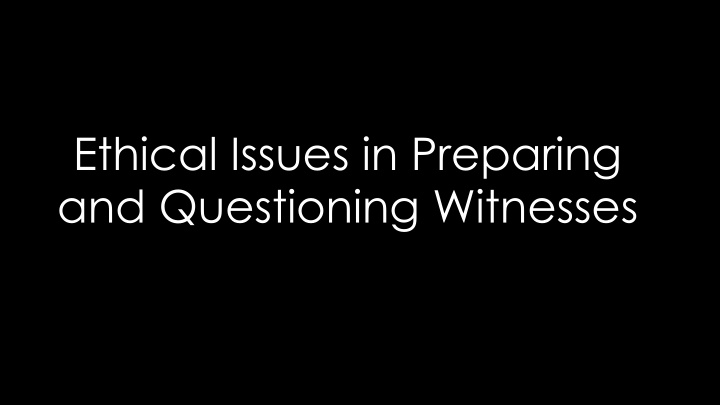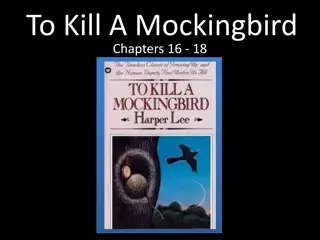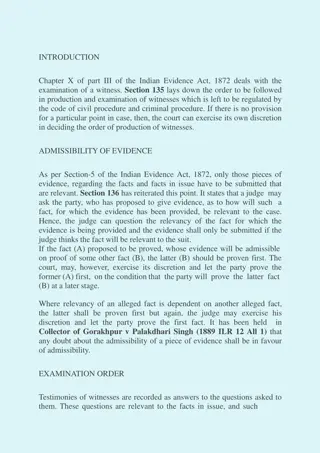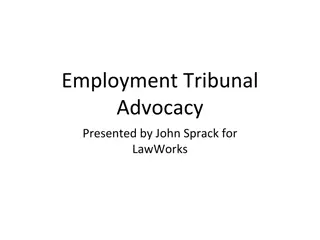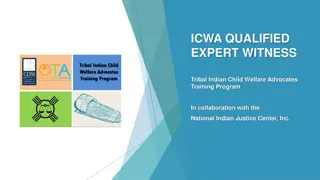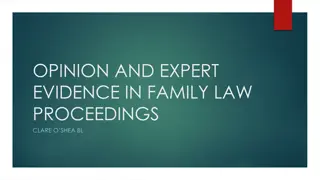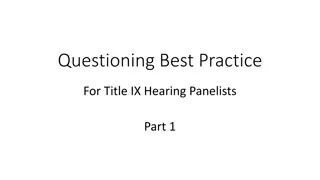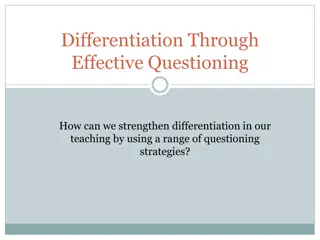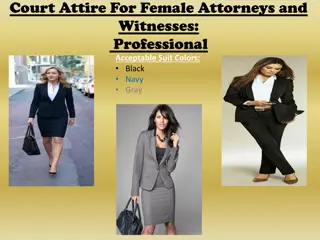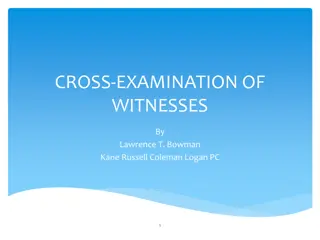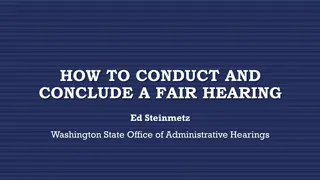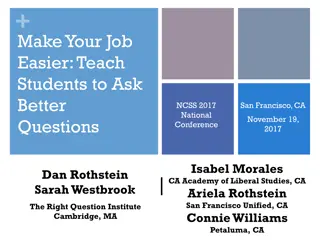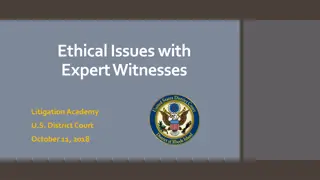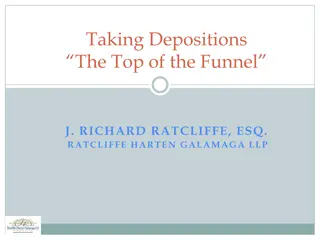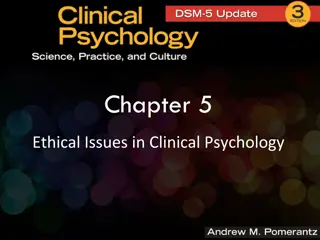Ethical Issues in Preparing & Questioning Witnesses
Ethical implications of preparing and questioning witnesses in legal settings. Covering the duties of lawyers in witness preparation, the importance of truthfulness, and guidelines for effective witness questioning. Addressing the delicate balance between preparing a witness and ensuring truthful testimony.
Download Presentation

Please find below an Image/Link to download the presentation.
The content on the website is provided AS IS for your information and personal use only. It may not be sold, licensed, or shared on other websites without obtaining consent from the author.If you encounter any issues during the download, it is possible that the publisher has removed the file from their server.
You are allowed to download the files provided on this website for personal or commercial use, subject to the condition that they are used lawfully. All files are the property of their respective owners.
The content on the website is provided AS IS for your information and personal use only. It may not be sold, licensed, or shared on other websites without obtaining consent from the author.
E N D
Presentation Transcript
Ethical Issues in Preparing and Questioning Witnesses
A lawyer may interview a witness for the purpose of preparing the witness to testify. Restatement (Third) of the Law Governing Lawyers, 116(1)
[A] lawyer has an ethical duty to prepare a witness. Christy v. Pennsylvania Tpk. Comm'n, 160 F.R.D. 51, 53 (E.D. Pa. 1995)
A lawyer shall not . . . counsel or assist a witness to testify falsely . . . . Rule 3.4(b) Rhode Island Rules of Professional Conduct
A lawyer may interview a witness for the purpose of preparing the witness to testify. A lawyer shall not . . . counsel or assist a witness to testify falsely . . . . Is there any tension?
Some common advice tell the witness to: answer truthfully maintain neutrality only answer the question asked give only the best present recollection refrain from volunteering information testify only from personal knowledge use everyday language testify spontaneously avoid memorization pause before answering admit to lack of knowledge where appropriate, and clarify any unclear questions.
The rule of thumb [is] that an attorney may instruct a witness how to testify, but should refrain from telling a witness what to say. Joseph D. Piorkowski, Jr., Professional Conduct and the Preparation of Witnesses for Trial: Defining the Acceptable Limitations of "Coaching", 1 Geo. J. Legal Ethics 389, 390 (1987)
Arent you really telling me . . . Before you tell me your side of the story, let me tell you what the law is in this area . . . Does any of this ring a bell? Well, that s not how your boss remembers it. If you say that, you'll lose.
[S]ooner or later, most of us trim the sail of the testifying client a bit too much. It is one thing to say, No perjury, and yet another to avoid it always or to encourage it never. Berg, Preparing Witnesses, Litigation, Winter 1987, at 13-14)
What to say to the witness right up front? The most important thing is to tell the truth. Now, the truth is an elusive concept . . .
In preparing a witness to testify, a lawyer may invite the witness to provide truthful testimony favorable to the lawyer's client. . Restatement (Third) of the Law Governing Lawyers, 116, comment b
According to the Restatement, witness preparation may properly include: Discussing the role of the witness and effective courtroom demeanor; discussing the witness's recollection and probable testimony; . . .
Could reviewing a witnesss recollection ever amount to improper witness coaching?
Your client is charged with murder. He will be defending at trial on grounds of self-defense. A witness, Mrs. W., observed the event. She agrees to come to your office for pretrial preparation. She describes the following: Your client was being terribly beaten until he pulled out a knife and repeatedly thrust it into his attacker's heart. TEST PROBLEM
You are concerned that if she testifies that he repeatedly thrust the knife into the attacker's heart, these words convey viciousness that could convince the jury it was not just self-defense. Is it ethically proper to suggest that Mrs. W use different words? TEST PROBLEM
The Restatement says: However, a lawyer may not assist the witness to testify falsely as to a material fact. A lawyer may suggest choice of words that might be employed to make the witness's meaning clear. Does this help?
Possible approach: Mrs. W, if you say that, the jury could think this was just a fight. Could you use words that will make my client look better? Good idea? TEST PROBLEM
Better approach: Mrs. W, let me ask about what you said, that my client was being terribly beaten, and then my client s response, he thrust his knife into his attacker's heart. Mrs. W, do you know for a fact that the knife went into his heart? [no, not specifically, I saw it go into his chest] TEST PROBLEM
And Mrs. W, when you say repeatedly, what does that mean to you? [well, it was several times, maybe two or three] So what you are really saying is that you saw my client being severely beaten, and he responded by stabbing his attacker, maybe two or three times in the chest? [yes] TEST PROBLEM
Remember, at trial, you will need to describe what you saw as honestly and accurately as you can. Will you be sure to use words that accurately describe what you saw? TEST PROBLEM
Attorneys should exercise the utmost caution, however, in recommending changes in word choice to a witness. Joseph D. Piorkowski, Jr., Professional Conduct and the Preparation of Witnesses for Trial: Defining the Acceptable Limitations of "Coaching", 1 Geo. J. Legal Ethics 389, 400 01 (1987)
The line is not easily drawn between proper review of the facts and refreshment of the recollection of a witness and putting words in the mouth of the witness or ideas in his mind. Hamdi & Ibrahim Mango Co. v. Fire Ass'n of Philadelphia, 20 F.R.D. 181, 183 (S.D.N.Y. 1957)
A lawyer's duty is to extract the facts from the witness, not pour them into him. In re Eldridge, 82 N.Y. 161, 171 (1880)
According to the Restatement, witness preparation may also properly include: discussing the applicability of law to the events in issue; . . .
Consider this Before you say any more about why you were fired, let me tell you what the law will require us to show. What are legitimate reasons for saying this? Could this assist a client to testify falsely?
Cornell Law School says: Whether the attorneys technique is proper depends in part on his motive and the client's motive. . . . As long as the attorney in good faith does not believe that he or she is participating in the creation of false evidence, the attorney may resolve reasonable doubts in favor of the client and may explain the law before hearing the facts.
According to the Restatement, witness preparation may also properly include: revealing to the witness other testimony or evidence that will be presented and asking the witness to reconsider the witness's recollection or recounting of events in that light ; . . .
In United States v. Massaoui, the government prosecuted the only perpetrator not killed in the 9/11 terrorist attacks. In sentencing, it came to light that a government prosecutor had provided witnesses transcripts of prior witness testimony. She had also sent e-mails advising them how to avoid the problems in earlier witnesses testimony.
The problem? The judge saw this as a blatant violation of her witness sequestration order. The judge struck the tainted witnesses from testifying at sentencing. The defendant received life in prison, rather than a death sentence.
According to the Restatement, witness preparation may also properly include: reviewing the factual context into which the witness's observations or opinions will fit; reviewing documents or other physical evidence that may be introduced; . . .
According to the Restatement, witness preparation may also properly include: discussing probable lines of hostile cross- examination that the witness should be prepared to meet ; . . .
Preparing a client to testify truthfully? [A]n attorney can, and should, critically examine a witness's testimony, discuss with the witness other relevant evidence, work to refresh the witness's recollection, and prepare the witness for questioning on direct and cross- examination. Ibarra v. Baker, 338 F. App'x 457, 465 (5th Cir. 2009)
Coaching a witness to lie on the stand is one kind of egregious violation of professional ethics. In re Crossen, 450 Mass. 533, 576, 880 N.E.2d 352, 384 (2008)
The bottom line is that virtually all witness preparation tactics-even those routinely utilized by lawyers-can raise ethical questions. Timothy J. Miller, Matthew J. Singer, Ethical Limits on Witness Preparation, CBA Rec., September 2015, at 24, 26
Shaping Recollections: What is proper? A bicyclist was injured in a collision with a truck. The truck driver said the bicyclist had attempted to pass the truck. The truck driver s lawyer drafted an affidavit for a witness to the accident that included a statement that he saw the bicyclist attempt to pass the truck. The witness told the lawyer he never even saw the bicycle.
Shaping Recollections: What is proper? The lawyer responded, we can change [the statement] now, or we can just leave [it] like that. The witness witness did not object to leaving the statement as it was, but told the attorney that if he was later asked, he would deny that he saw the bicycle. Nonetheless, the attorney said it was appropriate to leave the statement in the affidavit, the witness it, and it was notarized. witness signed
Result? The court sanctioned the attorney, ordered him to pay plaintiffs fees and costs spent litigating the false affidavit issue, and disqualified the attorney and his law firm from further representing defendants in the case. Knox v. Hayes, 933 F. Supp. 1573 (S.D. Ga. 1995)
Shaping Recollections: What is proper? Plaintiff's attorneys conducted a series of interviews with a witness. After the last interview, they prepared an affidavit. The attorneys specifically told the witness that the affidavit contained a few assertions not made by the witness, but that the attorneys believed to be true. They also instructed the witness to very carefully review the affidavit.
Shaping Recollections: What is proper? The witness made several changes to the draft affidavit, and deleted certain facts of which she believed she did not have personal knowledge. The attorneys aggressively attempted to persuade her to include the facts in her affidavit by describing their understanding of the course of events and showing the witness independent evidence supporting their theories.
Shaping Recollections: What is proper? After the witness refused to alter her revisions to the affidavit, the attorneys prepared a final affidavit incorporating the witness's changes. Did the attorneys act unethically? NO, says the court.
Key distinction? Plaintiffs attorneys did not ask the witness witness to make statements that they knew were false; instead, they attempted to convince her to adopt statements that they believed were true. Resolution Trust Corp. v. Bright, 6 F.3d 336 (5th Cir. 1993) (no improper coaching)
In Resolution Trust, the lawyers repeatedly emphasized that the witness witness must tell the truth, even while aggressively challenging the witness's witness's perception of events and asking her to change the substance of her affidavit. The lawyers' emphasis on candor-even as they attempted to persuade the witness make changes to her affidavit-was a key. witness to
